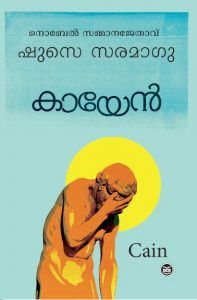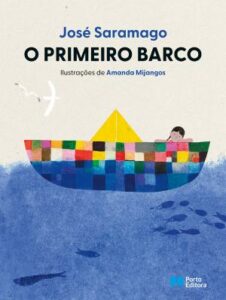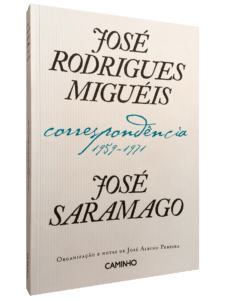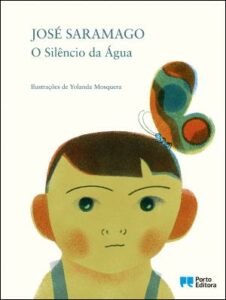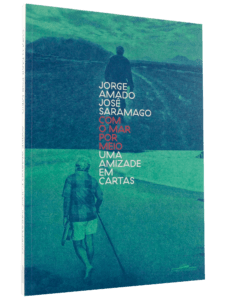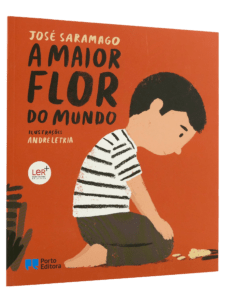Cain
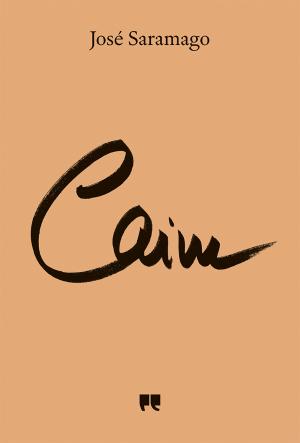
I have thought for many years that the story of Cain, like so many other biblical stories, is poorly told. I do not absolve Cain, but I accuse God of being responsible for the murder by refusing his offering
Foundation
Portugal
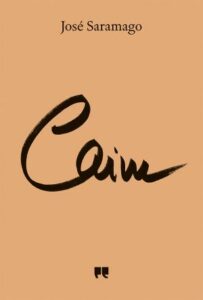
The calligraphy on the cover is by the writer and journalist Clara Ferreira Alves
"The history of men is the history of their disagreements with God, neither does he understand us, nor do we understand him."
Foundation
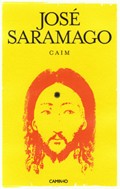
Leya / Editorial Path
2009, 12th ed., 2011
Language
Portuguese
"The history of men is the history of their disagreements with God, neither does he understand us, nor do we understand him." José Saramago
“By faith Abel offered God a better sacrifice than Cain's. Because of his faith, God considered him his friend and gladly accepted his offerings. And it is by faith that Abel, although he died, still speaks.” (Hebrews, 11.4)
Albania
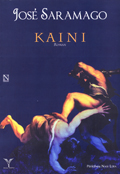
Botimet Dudaj
2012 (Trans.: Nasi Lera)
Language
Albanian
2012 (Trans.: Nasi Lera)
Germany
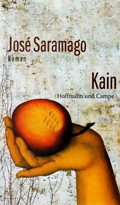
Das Vermächtnis des Nobelpreisträgers
José Saramago war bekennender Atheist und eckte regelmäßig bei der katholischen Kirche an. In seinem letzten Roman schreibt er die Bibel kurzerhand a und lässt den Brudermörder Kain eine ganz eigene Reise durchs Alte Testament antreten. Mit Phantasie, Ironie und einem Schuss Boshaftigkeit führt der große Romancier die göttliche Allmacht ad absurdum.
„Die Geschichte der Menschheit ist die Geschichte ihrer Uneinigkeit mit Gott, weder versteht er uns, noch verstehen wir ihn“, heißt es in Saramgos Kain, und es könnte das Motto des Buches sein. Saramago schickt seinen Kain an die unterschiedlichsten Schauplätze des Alten Testaments und lässt ihn aktiv an den biblischen Episoden teilhaben. So ist Kain dabei, als Abraham aufgefordert wird, seinen Sohn Isaak zu opfern, wobei er ihm überzeugend die Unsinnigkeit dieses Unternehmens vor Augen führt und Schlimmeres abwendet. Er interpretiert auf seine Weise die Zerstörung von Sodom und Gomorrha, ist fassungslos angesichts der Babel'schen Sprachverwirrung und findet sich am Ende auf der Arche Noah wieder. „Portugals bedeutendster Romancier“ (Die Zeit) hat mit Kain ein kraftvolles, provozierendes letztes Werk geschrieben.
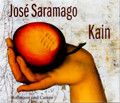
Hoffmann and Camp
2011 (Audiobook – Voice: Helmut Krauss) (Trans.: Karin von Schweder-Schreiner)
Language
German
»Die Geschichte der Menschheit ist die Geschichte ihrer Uneinigkeit mit Gott« sagt der Erzähler in diesem Roman, in dem Saramago die göttliche Allmacht ad absurdum führt.
»Die literarische Stimme Portugals.« Der Spiegel
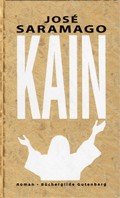
In Kain schreibt José Saramago die Bibel kurzerhand um lässt den Brudermörder eine ganz eigene Reise durchs Alte Testament antreten. Mit Phantasie, Humor und einem Schuss Boshaftigkeit führt der bekennende Atheist mit seinem letzten Wer die göttliche Allmacht ad absurdum.
„Die Geschichte der Menschheit ist die Geschichte ihrer Uneinigkeit mit Gott, weder versteht er uns, noch verstehen wir ihn“, heißt es in Saramagos Kain, und es könnte das Motto des Buches sein. Saramago schickt seinen Helden nach dem von ihm begangenen Brudermord an die unterschiedlichsten Schauplätze des Alten Testaments und lässt ihn aktiv an den biblischen Geschichten teilhaben. So trifft Kain, der in der Zeit vor und zurück katapultiert wird, auf die verführerische Lilith, die ihn sofort als Liebhaber vereinnahmt; er ist als Retter zur Stelle, als Abraham sich in Gottes Auftrag anschickt, seinen Sohn Isaak zu opfern; er verfolgt fassungslos die Zerstörung von Sodom und Gomorrha. Stets stellt der staunende, vermeintlich naive Kain die göttliche Vernunft in Frage – ob es sich a Gottes „unrühmliche“ Rolle in dem ureigenen Bruderzwist handelt, ob a die Babel'sche Sprachverwirrung oder den Kalbz ums. Und auch Saramagos geistreicher, unermüdlich kommentierender Erzähler macht einmal mehr deutlich, dass göttliches Handeln mit rationalem Denken nicht nachzuvollziehen ist.
“Die Sprache hat, was sie bei diesem Author immer hat: Ironie und ungeheure Sogwirkung. Der Meister präsentiert die Schauplätze des Alten Testaments in farbenfrohen Tableaus. Er entlarvt only manche Bibelgeschichte als Nonsens, manch andere schreibt er einfach one. Er amüsiert seine Leser durch gezielt platzierte Anachronismen.” Deutschlandradio Kultur
“Saramago hat sichtlich Spaß an seiner Dekonstruktion Gottes. Nachdem er in “Das Evangelium nach Jesus Christus” from the Neue Testament bereits kritisch hinterfragte, widmet er sich nun dem Alten – eine dankbare Quelle, wenn man sich auf die Suche nach einem degreesamen Gott begibt.”
NDR
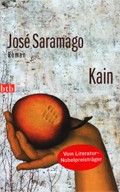
btb verlag
2012 (Trans.: Karin von Schweder-Schreiner)
Language
German
Der bekennende Atheist José Saramago schreibt in seinem letzten Roman kurzerhand die Bibel a und lässt den Brudermörder Kain eine ganz eigene Reise durchs Alte Testament antreten. So trifft Kain, der in der Zeit vor und zurück katapultiert wird, auf die verführerische Lilith, rettet Isaak vor der Opferung durch seinen Vater Abraham, verfolgt fassungslos die Zerstörung von Sodom und Gomorrha. Immer wieder stößt er dabei auf die Erkenntnis, dass göttliches Handeln mit rationalem Denken schwerlich nachzuvollziehen ist.
Argentina
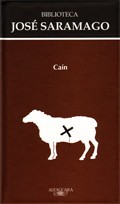
Qué diablo de Dios is this who, to exalt Abel, despises Caín.
If in El Evangelio according to Jesus Christ José Saramago in his vision of the New Testament, in Caín he returns to the first books of the Bible. On a heterodox route, he travels through decaying cities and stables, tyrants' palaces and battlefields of the man of the main protagonists of the Old Testament, imprinting on him the music and the refined humor that characterize his work.
Caín brings to light what is modern and surprising in Saramago's prose: the ability to make new a story that is known from beginning to end. An ironic and biting recourse in which the reader watches a secular war, in a certain way, involuntarily, between the creator and his creature.
Bulgaria
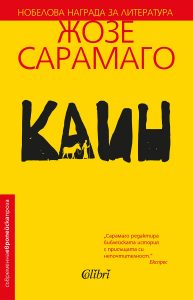
Последният роман на Жозе Сарамаго, „Каин“, and своеобразен „римейк“ на част от Стария завет. Историята обхваща периода от момента когато още в райската градина Бог осъзнава, че е забравил да даде на Адам и Ева дара на речта, до "акостирането" на Ноевия ковчег на планината Арарат. Главният герой е презреният братоубиец Каин.
Осъден да се скита завинаги след като убива Авел, Каин обикаля света в компанията на своя осел и става свидетел и участник в множество библейски истории и епизоди. Люби се със злата царица Лилит, ема страната на Йов в облога между Бог и Сатаната, пътува с Новчег ковия . Каин смята, е действията на ог са жестоки и несправедливи, ротивопоставя му се, спори с него.
Написан през последните години от живота на големия писател, романът засяга много морални въпроси, по които Сарамаго, също като героя си, спори с властния и авторитарен Бог още от провокативното "Евангелие по Исуса Христа". „Каин“ and стряскаща книга – завладяваща, чувствена, иронична. Достоен завършек на литературната кариера на един огромен талант.
Този роекте инансиран с подкрепата на програма “Творческа Европа” на Европейската комисия.
This project has been funded with support from the Creative Europe Program of the European Commission.
Work published with the support of Instituto Camões — Portugal.
Brazil
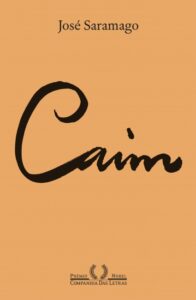
A caligrafia da capa é da autoria do escritor Milton Hatoum.
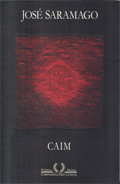
If, in The Gospel According to Jesus Christ, José Saramago gave us his vision of the New Testament, in this Cain he turns to the first books of the Bible, from Eden to the flood, printing the music and refined humor that mark his work in the Old Testament. On an unorthodox itinerary, Saramago travels through decaying cities and stables, tyrants' palaces and battlefields, as the reader follows a centuries-old, and somewhat involuntary, war between creator and creature. Along the way, the reader will revisit familiar biblical episodes, but from an entirely different perspective.
To cross this arid path, a god at odds with his own administration will place Cain, murderer of brother Abel and eldest son of Adam and Eve, in a haughty donkey, and it will be up to the pair to find their way among the traps of time that insist on attracting them . To Cain, who bears the mark of the Lord on his forehead and therefore is protected from the iniquities of man, all that remains is to accept the bitter fate and agree with the creator, to whom he does not reserve the best of judgments. Like the devil in The Gospel, the god that the reader encounters here is not the usual one of sermons: by reinventing the Old Testament, Saramago also recreates its main protagonists, giving them a complex and ironic appearance at the same time, whose tone is farce of the narrative only accentuates it.
The return to religious themes also serves to highlight what is modern and surprising in Saramago's prose: here, the ability to renew a story we know from end to end, revealing with biting what is hidden in the cracks of these old legends. Armed with a fierce humorous vein, Saramago narrates a strange war between man and master. More than that, it delves deeply into the narrative possibilities of the Bible, demonstrating again that, by recounting myth and confronting tradition, the good author returns to the surface with a story as current and relevant as it can be.
Korea
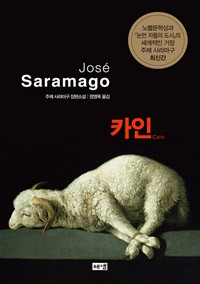
『예수복음』을 더하고
『눈먼 자들의 도시』로 묵시록을 재해석한
주제 사라마구, 『카인』으로 구약성서를 가로지르다!
독특한 내레이션 방식, 우화적 수법, 환상적 요소의 도입으로
구약성서를 재해석한 주제 사라마구 불후의 작품
하나님이 자신보다 ? 정말 하나님은 카인은 저버리고 아벨만 ?
주제 사라마구의 회개를 촉구하는 데 죄 년 년 이후 세계 독자들을 감동시키고 의식을 환기해 왔다.
사라마구는 카인이 형식을 빌려 소설을 전개한다 . 카인에게 비춰지는 하나님의 형상은 결코 너그럽지도 자애롭지도 않다 않다. 아들을 희생으로 그들 마지막 다 죽은 사건 하나님의 존재를 이른다.
이 작품의 상상력을 가진, 1998년 노벨문학상을 수상한 포르투갈의 작가 , 《뉴요커》 에서는 “불경스럽게도 구약성경을 개작하면서도 극찬했다 극찬했다.
하나님께 내쫓기고 . 한 해를 에서 꼭 읽어봐야 할 명작이다.
주제 사라마구의 <인간의 조건 3부작> 『눈먼 자들의 도시』 없는 자들의 도시』 도시』 『수도원 의 비망록』 『예수복음』 욕구를 신작 (과)초기작 초기작 『바닥에서 일어서서』『히카르두 헤이스 가 죽은 해』 등을 계속 펼쳐내는 세계 .
Denmark
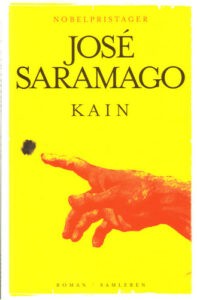
Samlerens
2013 (Trans.: Tine Lykke Prado)
Language
Danish
I Kain lader Saramago Eva gå tilbage til Paradis efter syndefaldet. Af en ærkeengel får hun lov til at hente noget af den frugt, der ellers ville gå til spilde. Men selv om hun sværger over for Adam, at hun ikke tilbød noget til gengæld, er deres første barn mistænkelig blond og lys i huden. Da Kain senere må vandre over jorden alene, møder han Abraham og Isak. Det lykkes Kain at forhindre Abraham i at slå sin egen søn ihjel. Den engel, der af Gud havde fået besked på at forhindre mordet, ankommer forsinket pga. vingeproblemer. Englen undskylder, men Kain spørger, hvad der dog ikke ville være sket, hvis han ikke havde grebet ind? Og yderligere: Hvad er det for en Gud, der kan ende på at bede en far om at ofre sin søn?
Press Script:
»José Saramago var autodidakt, en fremragende, ofte lystig fortæller, og hans sidste bog er ingen undtagelse.«
***** – Bettina Heltberg, Politiken ****** – Caspar Andreas Dyrehauge, KultuNaut
***** – Fyens Stiftstidende
»Her er der dejligt meget af det, der kendetegnede den fantastiske fortæller og gudsbenåede ateist: Den uendelige medlidenhed med den lidende menneskehed. Den allestedsnærværende ironi. Den umådelge uvilje mod al religiøst præk. Det suveræne sprog.«
****** – Søren Kassebeer, Berlingske Tidende
»Den portugisiske mester José Saramago kombinerer uhørt elegant prose og sønderlemmende religionskritik i en fantastisk roman.«
****** – Peter Adolphsen, Jyllands-Posten
Spain
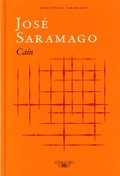
Alfaguara / Penguin Random House
2011 (Saramago Library Collection) (Trans.: Pilar del Río)
Language
Spanish
¿Qué diablo de Dios es este that, to exalt Abel, despises Caín? If in El evangelio according to Jesus Christ José Saramago in his vision of the New Testament, in Caín he returns to the first books of the Bible.
On a heterodox route, he travels through decaying cities and stables, tyrants' palaces and battlefields of the man of the main protagonists of the Old Testament, imprinting on him the music and the refined humor that characterize his work.
It reveals what is modern and surprising in Saramago's prose: the ability to make a story that is known from beginning to end. An ironic and biting recourse in which the reader watches a secular war, in a certain way, involuntarily, between the creator and his creature.
There is a review…
«Saramago elaborates in Caín in the clash of a chronicle of a personal misunderstanding with religion, rather than a parable of human understanding.»
Francisco Martínez Hidalgo
"Despite his age, Saramago demonstrates to us with Caín that he is able to continue offering his lectors attractive works, which seek to reach the pith of our most incisive conflicts."
Javier Munguía
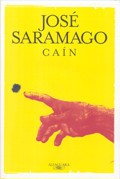
Alfaguara
2009 (Trans.: Pilar del Río)
Language
Spanish
¿Qué diablo de Dios es este that, to exalt Abel, despises Caín? If in El evangelio according to Jesus Christ José Saramago in his vision of the New Testament, in Caín he returns to the first books of the Bible.
On a heterodox route, he travels through decaying cities and stables, tyrants' palaces and battlefields of the man of the main protagonists of the Old Testament, imprinting on him the music and the refined humor that characterize his work.
It reveals what is modern and surprising in Saramago's prose: the ability to make a story that is known from beginning to end. An ironic and biting recourse in which the reader watches a secular war, in a certain way, involuntarily, between the creator and his creature.
There is a review…
«Saramago elaborates in Caín in the clash of a chronicle of a personal misunderstanding with religion, rather than a parable of human understanding.»
Francisco Martínez Hidalgo
"Despite his age, Saramago demonstrates to us with Caín that he is able to continue offering his lectors attractive works, which seek to reach the pith of our most incisive conflicts."
Javier Munguía
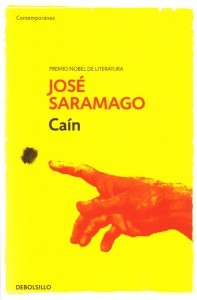
Alfaguara / Penguin Random House
2015 (DeBolsillo — Contemporánea) (Trans.: Pilar del Río)
Language
Spanish
¿Qué diablo de Dios es este that, to exalt Abel, despises Caín? If in El evangelio according to Jesus Christ José Saramago in his vision of the New Testament, in Caín he returns to the first books of the Bible.
On a heterodox route, he travels through decaying cities and stables, tyrants' palaces and battlefields of the man of the main protagonists of the Old Testament, imprinting on him the music and the refined humor that characterize his work.
It reveals what is modern and surprising in Saramago's prose: the ability to make a story that is known from beginning to end. An ironic and biting recourse in which the reader watches a secular war, in a certain way, involuntarily, between the creator and his creature.
There is a review…
«Saramago elaborates in Caín in the clash of a chronicle of a personal misunderstanding with religion, rather than a parable of human understanding.»
Francisco Martínez Hidalgo
"Despite his age, Saramago demonstrates to us with Caín that he is able to continue offering his lectors attractive works, which seek to reach the pith of our most incisive conflicts."
Javier Munguía
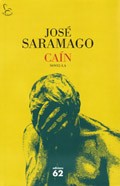
Un cant a la freedom of thought in favor of l'home.
Posing the proof of this powerful imaginative narrative in narrative, José Saramago re-wrote, in addition to his ironic and puny, characteristic style, a story that all of them connect: the story of Caín i Abel. . Of the only protagonists, Caín i Déu, the month ben dit tres, perquè tota la humanitat amb les seves diverses expressions i pulsacions covers Caín's life.
Sense embuts ni subterfugis, i amb el punt d'humor i irreverence that suits, the Portuguese Nobel fa a recurgut mordaç per several biblical passages to address a question that during millennis has been considered untouchable i innombrable en toles les cultures : the divinity i the set of norms i precepts that men establish in their environment i that they carry to demand an inviolable i absolute faith in which tot falls justifiably, from negation to a mateix purposes to l'extenuation a la mort en sacrificio to kill en nom de Deu.
Already L'evangeli segons Jesucrist, Cain is a necessary and critical novel that by no means completes the commitment of the author amb la responsabilitat d'escriure. Un cant a la freedom of thought in favor of l'home.
Slovenia
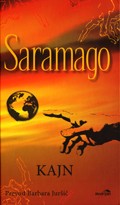
Nobelovec José Saramago je ob predstavitvi Roman Kajn (2009) dejal, da bi bilo človeški družbi bolje, ko ne bi poznala Svetega pisma. Po njegovem mnenju je bila Biblija katalog največjih hudobij in krutosti človeške narave. V romanu Kajn Saramago nekatere najbolj znane prizore iz Svetega pisma obnovi tako, da jih preizprašuje na podlagi odnosa človek – bog in pokaže, da je zgodovina ljudi »zgodovina njihovih ne negorazm zgodovina njihovih ne négorazoglas. Kajn namreč spoznava, da je bog trmast, muhast, egoističen in nagnjen k jezi. Tako se Kajn ob pogledu na Adama in Evo, ki jesta s prepovedanega drevesa, sprašuje, ali ni bil gospod nepreviden, ko je posadil strupeno drevo, »kajti če bi res hotel, da ne jesta od tistega toel zadevia sadeža, binos , pač ne bi posadil drevesa ali pa bi ga postavil na drugo mesto ali big ga obdal z žično ograjo«. Ali ko Abraham žrtvuje sina Izaka: »Bralec je prav prebral, gospod je ukazal abrahamu, naj mu žrtvuje lastnega sina, to je storil povsem prostodušno, kot bi prosil za kozarec vode, ko si žemeni navadi, očitno zelo zakoreninjeni. Logično, običajno, skratka človeško bi bilo, from bi abraham gospoda nekam poslal, to tega ni storil.« In se sprašuje: »Kakšen gospod je to, ki ukaže očetu, naj ubije lastnega sina?
V romanu je vse polno posrečenih, hudomušnih pripomb »na račun« Svetega pisma oziroma boga. Ob prizoru s Sabejci in Kaldejci se pripovedovalec čudi, »da lahko satan po milli volji razpolaga s saberjci in kaldejci za uresničevanje svojih lastnih interesov, s še večjim začudenjem večjim začudenjem . /…/ Skratka, ali satan zmore veliko več, kot si mislimo, ali pa smo priča strašnemu prizoru tihega sporazuma, če nič drugega, vsaj tihega, med malignant in benign platjo sveta. v njej. Pravi, da smo si s tem, ko smo si izmislili boga, postali nevede tudi njegovi sužnji … Božja jeza v Svetem pismu je jeza, ki smo si jo izmislili ljudje. In tu postavlja ključno vprašanje: Zakaj vsa ta žrtvovanja, krutosti, prelivanja krvi, nečloveškosti, obsodbe, trpljenja?
Roman je bil ob izidu poleg naklonjenih ocen deležen tudi zelo ostrih kritik, ki jih je po Saramagovem mnenju naročila Katoliška cerkev. Leta 2010, že po pisateljevi smrti, je bil nominiran za nagrado portugalskega Telecoma za književnost.
USA
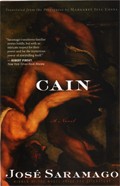
“Reading the Portuguese writer José Saramago, one quickly senses the presence of a master.”
—Christian Science Monitor
“Saramago is the most tender of writers…with a clear-eyed and compassionate acknowledgment of things as they are, and a quality that can only be termed wisdom.”
—New York Times
In this, his last novel, Saramago daringly re-imagines the characters and narratives of the Bible through the story of Cain, who, condemned to wander forever after he kills Abel, is whisked around in time and space. He experiences the almost-sacrifice of Isaac by Abraham, the Tower of Babel, the destruction of Sodom and Gomorrah, Joshua at the battle of Jericho, Job's ordeal, and finally Noah's Ark and the Flood. And over and over again Cain encounters an unjust, even cruel God. A startling, beautifully written, and powerful book, in all ways a fitting end to Saramago's extraordinary career.
“Saramago juxtaposes an eminently readable narrative of work and poverty, class and desire, knowledge and timelessness—one in which God, too, as he faces Cain in the wake of Noah's Ark, emerges as far more human than expected.” —San Francisco Chronicle
In this, his last novel, José Saramago daringly reimagines the characters and narratives of the Old Testament, recalling his provocative The Gospel According to Jesus Christ. His tale runs from the Garden of Eden, when God realizes he has forgotten to give Adam and Eve the gift of speech, to the moment when Noah's Ark lands on the dry peak of Ararat. Cain, the despised, the murderer, is Saramago's protagonist.
Condemned to wander forever after he kills his brother Abel, Cain makes his way through the world in the company of a personable donkey. He is a witness to and participant in the stories of Isaac and Abraham, the destruction of the Tower of Babel, Moses and the golden calf, the trials of Job. The rapacious Queen Lilith takes him as her lover. An old man with two sheep on a rope crosses his path. And again and again, Cain encounters a God whose actions seem callous, cruel, and unjust. He confronts Him, he argues with Him. "And one thing we know for certain," Saramago writes, "is that they continued to argue and are arguing still."
A startling book—sensual, funny—and in all ways a fitting end to Saramago's extraordinary career.
“A winkingly blasphemous retelling of the Old Testament. . . Saramago, playfully stretching his chatty late style, pokes holes in the stated logic of the Biblical God throughout the novel.” —The New Yorker
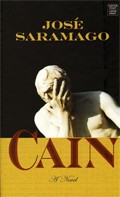
“With breathtaking imagination, acclaimed Portuguese author Saramago . . . revels in biblical themes for his final novel. . . Cain's vagabond journey builds to a stunning climax that, like the book itself, is a fitting capstone to a remarkable career. ” — Publishers Weekly, starred“Reading the Portuguese writer José Saramago, one quickly senses the presence of a master. ” — Christian Science Monitor
“Saramago is the most tender of writers. . . with a clear-eyed and compassionate acknowledgment of things as they are, and a quality that can only be termed wisdom. ” — New York Times
In this, his last novel, Saramago daringly re-imagines the characters and narratives of the Bible through the story of Cain. Condemned to wander forever after he kills Abel, he is whisked around in time and space. He experiences the almost-sacrifice of Isaac by Abraham, the Tower of Babel, the destruction of Sodom and Gomorrah, Joshua at the battle of Jericho, Job's ordeal, and finally Noah's ark and the Flood. And over and over again Cain encounters an unjust, even cruel God. A startling, beautifully written, and powerful book, in all ways a fitting end to Saramago's extraordinary career.
France
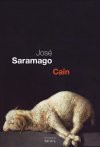
Victime de l'injustice de Dieu qui préfere les offrances d'Abel aux siennes, Cain, condamné à l'errance, part à l'aventure dans l'espace et le temps bibliques. Lover of l'insatiable Lilith, il est tantôt témoin tantôt protagonist of événements qui le révulsent et contre lesquels il s'insurge. Il arrête le bras d'Abraham, regarde épouvanté les children perir dans le brasier de Sodome, watch impuissant à la colère de Moise passant son propre peuple au fil de l'épée, observe the massacres of Jéricho, try d'adoucir de them Job.Et lorsqu'il monte dans l'arche of Noah, il prend a drastic decision qui met fin aux aux agissements inconsidérés de ce Dieu rancunier, cruel et corruptu.
Vingt ans après l'Evangile selon Jesus Christ, José Saramago frees a roman à l'humour corrosif sur la guerre millenaire between l'homme et Dieu, between le créateur et sa creature.
« Saramago, avec sa facétie et son irrévérence charactéristiques, vient correcter l'Histoire. »
L'Express
Georgia
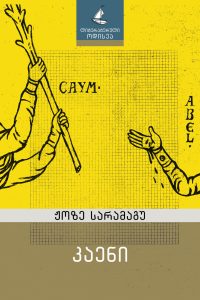
სარამაგუს ბოლო რომანი „კაენი“ ძველი აღთქმის „რემეიქია“. ნაწარმოების სიუჟეტური ქარგა და გვევლინება. ძმის მკვლელი . ეს საინტერესო, საინტერესო, ირონიით აღსავსე ტექსტი მწერლის შემოქმედების ბრწყინვალე დამაგვირგვინებელი აკორდია.
Greece
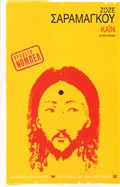
Η Bίβλος, ένα από τα πιο άγρια βιβλία που έχουν γραφτεί ποτέ και που, κατά τον διάσημο νομπελίστα συγγραφέα, δεν θα έπρεπε να πέφτει ποτέ στα χέρια των παιδιών, ξαναγράφεται από τον ίδιο με απρόβλεπτο τέλος, δίνοντας την ευκαιρία για έναν σπαρταριστό διάλογο μεταξύ Θεού και ανθρώπου.
Εξάλλου «η ιστορία των ανθρώπων είναι η ιστορία της ασυνενοησίας με το Θεό – ούτε ανθεατός ακαλι αταλι αταλι
Netherlands
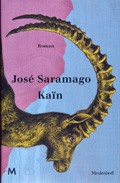
In ten geestige en confronterende roman stelt José Saramago dat god de mens helemaal niet begrijpt, en dat de mens god ook niet begrijpt. Door het verhaal van het Oude Testament opnieuw te vertellen, met in de hoofdrol Kain, die uit jaloezie zijn broer Abel vermoordde, vraagt Saramago zijn lezer: is ten moord eigenlijk wel de daad van Kain? Had god – die alles kan – ten daad niet kunnen tegenhouden, en is god daarom niet zelf verantwoordelijk voor de eerste moord in de geschiedenis van de mens? Met Kain levert José Saramago opnieuw een polemisch werk af, dat in zijn thuisland net als Het evangelie volgens Jezus Christus voor de nodige ophef zorgde. Minder valt ook niet te verwachten van de man die aangeeft dat de samenleving zonder by Bijbel beter af zou zijn geweest.
Hungary
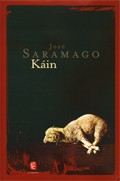
Ha az úrnak lenne egy fia, azt is megöletné, kérdezte izsák, Erre a jövő ad választ, Ez az úr mindenre képes, a jóra, a gonoszra is a még gonoszabbra is, Így van, Hant n engedel kérdezte izsák, Az úr romlással vagy betegséggel sújtja azt, aki nem teljesíti a rendelését, Bosszúálló isten a mi urunk, Azt hiszem, igen, válaszolt ábrahám lehalkítjt ahtm tl is elkövethet, kérdezte izsák, Bizony, hibákat és bűnöket is, Atyám, nem tudom elfogadni ezt a vallást, El kell fogadnod, nincs más választásod, most pedig kéréssel fordulok a sseltén agy, egy, egy, eg Not tudom, hogy képes leszek-e elfelejteni, atyám, még latom magamat, ahogy ott fekszem, megkötözve a fahasábokon, you're téged, ahogyan felemeled a karod, you're kezedben, megcsilnn én émnmnmnmnm em Azt akarod mondani, hogy az úr elveszi az emberek józan eszét, Igen, nagyon sokszor, csaknem mindig, válaszolta ábrahám, Akárhogyan is, a te kezedben volt a kés, Az úr mindent előkészített, és az utolsó pillanatban köztta, there
José Saramago, 2010-ben, nyolcvanhét éves korában elhunyt Nobel-díjas író életművének utolsó, nagy vihart kavaró művét tartja a kezében az Olvasó.
India
Italy
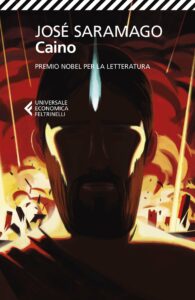
“La storia degli uomini è la storia dei loro fraintendimenti con dio, né lui capisce noi, né noi capiamo lui.”
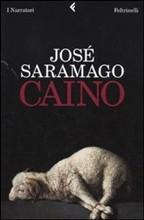
A vent'anni dal Vangelo secondo Gesù Cristo, José Saramago makes the occuparsi esplicitamente di religione with an impeccabile narrative proof per stile and irony. If in passato the Nobel Prize is given by the Portuguese version of the New Testament, now it is cemented with l'Antico. And for farlo, the personaggio pi negative, the biblical personification of the male, colui che uccide suo fratello: Caino. Capovolgendo la prospective tradizionale, Saramago ne fa un essere umano ne migliore ne peggiore degli altri. On the contrary, the word that comes to life from the narration is a word that is evil, unfair and invidious, which is not true that which is vuole and soprattutto non ama gli uomini. It is a dioche rfiuta, apparently just per capriccio and indifferenza, l'offerta di Caino, provoking così l'murder of Abele. Acknowledgment and permission to a life in the world, the destination of Caino is that of a picaro that travels on horseback by a mule across space and time, in a desolate land agli albori dell'umanità. Now the protagonist, now the simple spettatore, the simpatico question avventuriero a po' mascalzone attraversa tutti gli episodi più significative of the biblical narration: the cacciata dall'Eden, the adventure with the insaziabile Lilith, the sacrifice di Isacco de la costruzione Babele, the distribution of the Sodome, the episode of the vitello d'oro, proves it inflicts on the Giobbe town, and infine the vicenda dell'arca di Noè (all the fine quality, with a colpo by the conductor, the author changes radically corso della storia umana). An ironic and very personal script of the Bibbia, Caino is an eccezional invention of letteraria and a powerful allegory that met the scene of the sound of the sound of the crude of the peggiore degli uomini. L'opera maggiore di a scrittore nel pieno della its maturity, forse mai così libero, lucido and vivace.
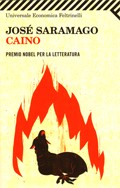
A vent'anni dal Vangelo secondo Gesù Cristo, José Saramago makes the occuparsi esplicitamente di religione with an impeccabile narrative proof per stile and irony. If in passato the Nobel Prize is given by the Portuguese version of the New Testament, now it is cemented with l'Antico. And for farlo, the personaggio pi negative, the biblical personification of the male, colui che uccide suo fratello: Caino. Capovolgendo la prospective tradizionale, Saramago ne fa un essere umano ne migliore ne peggiore degli altri. On the contrary, the word that comes to life from the narration is a word that is evil, unfair and invidious, which is not true that which is vuole and soprattutto non ama gli uomini. It is a dioche rfiuta, apparently just per capriccio and indifferenza, l'offerta di Caino, provoking così l'murder of Abele. Acknowledgment and permission to a life in the world, the destination of Caino is that of a picaro that travels on horseback by a mule across space and time, in a desolate land agli albori dell'umanità. Now the protagonist, now the simple spettatore, the simpatico question avventuriero a po' mascalzone attraversa tutti gli episodi più significative of the biblical narration: the cacciata dall'Eden, the adventure with the insaziabile Lilith, the sacrifice di Isacco de la costruzione Babele, the distribution of the Sodome, the episode of the vitello d'oro, proves it inflicts on the Giobbe town, and infine the vicenda dell'arca di Noè (all the fine quality, with a colpo by the conductor, the author changes radically corso della storia umana). An ironic and very personal script of the Bibbia, Caino is an eccezional invention of letteraria and a powerful allegory that met the scene of the sound of the sound of the crude of the peggiore degli uomini. L'opera maggiore di a scrittore nel pieno della its maturity, forse mai così libero, lucido and vivace.
Israel
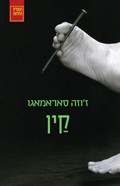
(מרים טבעון)]נגן צ’לו רווק, כלב בעל מחשבות וחלומות, ואשה יפה כבת שלושים-ושש או שלושים-ושבע, הם גיבוריו של רומאן זה, שהוא עוד”תולדות האדם הן תולדות אי-ההבנות עם אלוהים, הוא אינו מבין אותנו, ואנחנו איננו מבינים אותו”. כמעט שני עשורים לאחר ‘הבשורה על-פי ישו’ חוזר סאראמאגו – חתן פרס נובל לספרות וגדול סופרי אירופה במחצית השנייה של המאה העשרים – להקדיש רומאן שלם ליריבו הוותיק אלוהים, והפעם זה אלוהים של “הברית הישנה”. אף שקין ואלוהים “עודם מתווכחים”, כנראה עד עצם היום הזה, “הסיפור נגמר, לא יהיה עוד מה לספר”. בשבע המלים הללו סיים סאראמאגו את הרומאן האחרון שלו, וכעבור חודשים לא רבים, ביוני 2010, נפטר. ‘קין’ שלו, סאטירה חריפה ומשעשעת על ידו של אלוהים בעולם, מיטיב להשתחל דרך הסדקים והסתירות של הסיפור התנ”כי כדי לשוב ולהוכיח שאלוהים אינו יכול לשאת מראה של אדם מאושר. אלוהים, השותף-לדבר-עבֵרה של קין ברצח הבל, העניק לו, מתוך הכרה באשמתו-שלו, הגנת נצח על חייו, אך הפך אותו לנע-ונד בארץ, לגיבור הפיקרסקי הראשון. אולם קין של סאראמאגו לא רק נסחף ממקום למקום, ומסביבה חברתית אחת לאחרת, בקצב עלילה רב תהפוכות, אלא הוא גם פיקָרו הנודד בזמן וחוֹוה הרבה סוגי הווה. פריווילגיה זו, אולי עונש, אינה מעלל של כוחו של אלוהים, אלא מפעלו של “כוח אחר שיש ביקום” – מן-הסתם כוחו של סופר כמו סאראמאגו, היוצא בספר זה לקרב הגדול הסופי של חייו, שבו דומה שהוא הופך לכפילו של קין. קין יהיה נוכח בעקידת יצחק, במהפכת סדום ועמורה, במדבר עם משה, ביריחו כעוזר לווטרינר חמורים בצבא יהושע; הוא יהיה פועל אצל איוב, נוסע בתיבת-נוח וכו’. תחבולתו העיקרית של הרומאן היא היצמדותו בעמודים רבים לפרפראזה מדויקת של הטקסט התנ”כי, משפט אחר משפט, והטקסט הזה זוכה במפתיע להזרה והופך לקומדיה ארסית. אבל סאראמאגו הסונֵט מפַנה שוב ושוב את מקומו בספר לסאראמאגו המסתכל, בעל הדמיון והכושר התיאורי המדהימים, הכותב סצנות בכישרון ובהומור נדירים. כגון הסצנה של הילד הרך קין המביט בצמיחתו של שתיל; או דמותו של החמור – דמות מרכזית – שצריך לדעת לפרש את תנועות אוזניו שהן מעין איתות טלגרף בדגלים שהטבע חנן אותו בהם. ייקח לקין זמן להבין למה הוא חי. מצופה פאסיבי במאורעות היסטוריים הוא יהפוך לאיש חופשי, בטוח בעצמו, המתייצב נגד אלוהים כשווה מול שווה ומסכל את הפרויקט הגדול שלו.
Norway
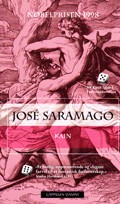
José Saramago (1922-2010) fikk sitt store gjennombrudd med Klosterkrønike. Hans arbeider er oversatt til over 40 språk, og han fikk Nobels litteraturpris i 1998. Saramago døde 18. juni 2010. Han var nettopp ferdig med det som skulle bli hans siste bok: Kain.
I Kain kan man si Saramago følger opp tråden fra både Klosterkrønike og Jesusevangeliet. Han gir oss sitt høyst personlige syn på Bibelens historier. De fleste kjenner historien om Kain som slo i hjel sin bror Abel. Det er Kain som dreper sin bror, men hvem har egentlig skylden i at Kain ble en morder?
Selv om det er bibelske fortellinger som er temaet, er dette langt fra noen teologisk avhandling eller essay. Det er en tettpakket roman, historiefortelling på sitt beste, som først får deg til å smile, deretter tenke.
Kain er en betydningsfull roman fra en av verdens virkelig store forfattere – og en verdig avslutning på et fantastisk forfatterskap.
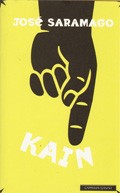
José Saramago (1922-2010) fikk sitt store gjennombrudd med Klosterkrønike. Hans arbeider er oversatt til over 40 språk, og han fikk Nobels litteraturpris i 1998. Saramago døde 18. juni 2010. Han var nettopp ferdig med det som skulle bli hans siste bok: Kain.
I Kain kan man si Saramago følger opp tråden fra både Klosterkrønike og Jesusevangeliet. Han gir oss sitt høyst personlige syn på Bibelens historier. De fleste kjenner historien om Kain som slo i hjel sin bror Abel. Det er Kain som dreper sin bror, men hvem har egentlig skylden i at Kain ble en morder?
Selv om det er bibelske fortellinger som er temaet, er dette langt fra noen teologisk avhandling eller essay. Det er en tettpakket roman, historiefortelling på sitt beste, som først får deg til å smile, deretter tenke.
Kain er en betydningsfull roman fra en av verdens virkelig store forfattere – og en verdig avslutning på et fantastisk forfatterskap.
Poland
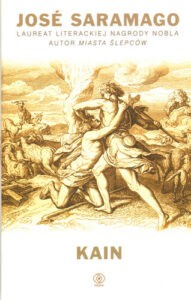
Absolutnie “heretycka” interpretacja biblijnych historii napisana z charakterystycznym dla Saramago humorem
Ostatnia powieść José Saramago. Dowcipna, ironiczna, ale jednocześnie głęboko filozoficzna przypowiastka o Kainie, który za swój zbrodniczy czyn został skazany przez Boga na wieczną tułaczkę. Pisarz, swoim charakterystycznym kwiecistym językiem, ze swadą i humorem, czasem cierpkim, przedstawia absolutnie “heretycką” interpretację biblijnych historii, które mogą być odczytywane jako manifest nonkonformizmu. Powieść, wydana na krótko przed śmiercią portugalskiego noblisty, to bezkompromisowa i gorzka refleksja nad naturą człowieka i Boga, ich moralną niejednoznacznością.
UK
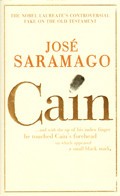
«Saramago is a writer, like Faulkner, so confident of his resources and ultimate destination that he can bring any improbability to life.» John Updike
«He was the equal of Philip Roth, Günter Grass, Thomas Pynchon and Don DeLillo. His genius was remarkably versatile – he was at once a great comic and a writer of shocking earnestness and grim poignancy.» Harold Bloom
«No candidate for a Nobel Prize has a better claim to lasting recognition that this novelist.» Edmund White
«He got ahead of us: he is ahead of us. His work belongs to our future. I take comfort in this.» Ursula K. Le Guin
The last novel to be written before the death of the great Portuguese novelist and Nobel Prize winner Jose Saramago, who passed away in June 2010 – a controversial book in the mode of The Gospel According to Jesus Christ
Two decades after Portuguese novelist and Nobel Laureate José Saramago shocked the religious world with his novel The Gospel According to Jesus Christ, he has done it again with Cain, a satire of the Old Testament. Written in the last years of Saramago’s life, it tackles many of the moral and logical non sequiturs created by a wilful, authoritarian God, and forms part of Saramago’s long argument with religion.
The stories in this book are witty and provocative. After Adam and Eve have been cast out of Eden, Eve decides to go back and ask the angel guarding the gate if he can give her some of the fruit that is going to waste inside. The angel agrees, and although Eve swears to Adam that she offered the angel nothing in return, their first child is suspiciously blond and fair-skinned. Cain, in his wandering, overhears a strange conversation between a man named Abraham and his son Isaac – and manages to prevent the father from murdering the son. The angel appointed by God to prevent the murder arrives late due to a wing malfunction. Cain brushes off his apology. ‘What would have happened if I hadn’t been here?’ Cain asks, ‘and what kind of god would ask a father to sacrifice his own son?’
Saramago died in June 2010, shortly after the controversial Portuguese publication of Cain but before he could participate in its publication in other countries. Harvill Secker’s edition of this remarkable book will be part of a tribute to Saramago’s life and work which includes the gradual reissue of his previous novels as Vintage Classics.
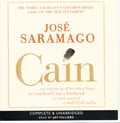
Harvill Secker
2011 (Audiolivro – Voz: Jay Villiers) (Trad.: Margaret Jull Costa)
Language
English
The last novel to be written before the death of the great Portuguese novelist and Nobel Prize winner Jose Saramago, who passed away in June 2010 – a controversial book in the mode of The Gospel According to Jesus Christ
Two decades after Portuguese novelist and Nobel Laureate José Saramago shocked the religious world with his novel The Gospel According to Jesus Christ, he has done it again with Cain, a satire of the Old Testament. Written in the last years of Saramago’s life, it tackles many of the moral and logical non sequiturs created by a wilful, authoritarian God, and forms part of Saramago’s long argument with religion.
The stories in this book are witty and provocative. After Adam and Eve have been cast out of Eden, Eve decides to go back and ask the angel guarding the gate if he can give her some of the fruit that is going to waste inside. The angel agrees, and although Eve swears to Adam that she offered the angel nothing in return, their first child is suspiciously blond and fair-skinned. Cain, in his wandering, overhears a strange conversation between a man named Abraham and his son Isaac – and manages to prevent the father from murdering the son. The angel appointed by God to prevent the murder arrives late due to a wing malfunction. Cain brushes off his apology. ‘What would have happened if I hadn’t been here?’ Cain asks, ‘and what kind of god would ask a father to sacrifice his own son?’
Saramago died in June 2010, shortly after the controversial Portuguese publication of Cain but before he could participate in its publication in other countries. Harvill Secker’s edition of this remarkable book will be part of a tribute to Saramago’s life and work which includes the gradual reissue of his previous novels as Vintage Classics.
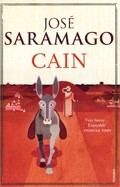
A controversial book in the mode of The Gospel According to Jesus Christ and the last novel to be written before the death of the great Portuguese novelist and Nobel Prize winner, Jose Saramago.
Two decades after Portuguese novelist and Nobel Laureate José Saramago shocked the religious world with his novel The Gospel According to Jesus Christ, he has done it again with Cain, a satire of the Old Testament. Written in the last years of Saramago’s life, it tackles many of the moral and logical non sequiturs created by a wilful, authoritarian God, and forms part of Saramago’s long argument with religion.
The stories in this book are witty and provocative. After Adam and Eve have been cast out of Eden, Eve decides to go back and ask the angel guarding the gate if he can give her some of the fruit that is going to waste inside. The angel agrees, and although Eve swears to Adam that she offered the angel nothing in return, their first child is suspiciously blond and fair-skinned. Cain, in his wandering, overhears a strange conversation between a man named Abraham and his son Isaac – and manages to prevent the father from murdering the son. The angel appointed by God to prevent the murder arrives late due to a wing malfunction. Cain brushes off his apology. ‘What would have happened if I hadn’t been here?’ Cain asks, ‘and what kind of god would ask a father to sacrifice his own son?’
Czech Republic

Mladý muž z ne zcela jasných důvodů zabil vlastního bratra. Po vraždě následoval rozsudek. Tím rozsudkem bylo vyhnanství. Muž se jmenoval Kain a jeho příběh je znám už přes dva tisíce let. Ten starý příběh o vině a trestu, spravedlnosti a odpovědnosti, se dočkal různorodých zpracování. V podání Josého Saramaga je to vyprávění plné humoru a pomalu stupňovaného napětí. Kain putuje napříč světem starozákonních příběhů a občas do nich i trochu zasáhne. Setká se s Abrahámem a v poslední chvíli zaskočí za anděla s porouchaným křídlem, přijme práci v Lotově domě, vyslechne kosmologickou debatu mezi Jozuem a Hospodinem před pádem Jericha a nakonec i nastoupí na archu s Noemovou rodinou. Především však vede vzdorný dialog s bohem. Podivuje se nad jeho rozhodnutími a dožaduje se vysvětlení těch, která chápe jako nespravedlivá. A když usoudí, že člověk a bůh se navzájem nikdy nedokážou pochopit, rozhodne se k zoufalému činu.
Romania
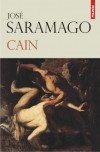
Ultimul roman al lui Jose Saramago, Cain (2009), reia intr-o perspectiva moderna povestea biblica a lui Cain si Abel. Dupa ce isi ucide fratele intr-un moment de frustrare, Cain ajunge la o intelegere cu un Dumnezeu care capata o ciudata aparenta dictatoriala si scapa condamnat la vesnica pribegie, cu un sac de merinde si avind drept tovaras un magar. Cutreierind lumea si timpurile, tinarul calator perturba povestile unei intregi distributii de personaje familiare – Noe, Moise, Isaac –, alterind pentru totdeauna cursul legendelor de-a lungul drumului. Cu caracterul sau nevolnic si cu desavirsire uman, Cain se straduieste sa inteleaga ideea credintei, socotelile si faptele unui Dumnezeu de nepatruns. Fara sa renunte la umor, romanul incheie o cariera scriitoriceasca remarcabila, ridicind o ultima intrebare in privinta vietii.
„La fel ca Faulkner, Saramago este un scriitor atit de increzator in resursele si finalitatea operei sale, incit poate aduce la viata orice improbabilitate.” (John Updike)
„Jose Saramago va ramine unul dintre marii clasici occidentali… In toate meditatiile sale incintatoare despre tristetile vietii noastre exista mereu un spirit jovial ce ne invata arta de-a merge cumva mai departe, caci opera sa este in sine o extensie a vietii.” (Harold Bloom)
„Ca si in romanul sau Evanghelia dupa Isus Cristos, Saramago recreeaza in Cain povesti cunoscute de toata lumea, dar o face tot timpul atent la puterea lor si la puterea misterioasa a povestitului. Departe de a le rastalmaci ori de a le trunchia, le schimba la nesfirsit perspectiva, ca in lumina iluzorie si tot timpul schimbatoare a unei prisme.” (The New York Times)
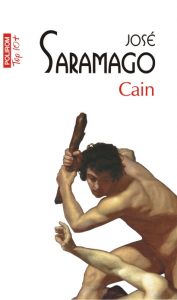
Ultimul roman al lui Jose Saramago, Cain (2009), reia intr-o perspectiva moderna povestea biblica a lui Cain si Abel. Dupa ce isi ucide fratele intr-un moment de frustrare, Cain ajunge la o intelegere cu un Dumnezeu care capata o ciudata aparenta dictatoriala si scapa condamnat la vesnica pribegie, cu un sac de merinde si avind drept tovaras un magar. Cutreierind lumea si timpurile, tinarul calator perturba povestile unei intregi distributii de personaje familiare – Noe, Moise, Isaac –, alterind pentru totdeauna cursul legendelor de-a lungul drumului. Cu caracterul sau nevolnic si cu desavirsire uman, Cain se straduieste sa inteleaga ideea credintei, socotelile si faptele unui Dumnezeu de nepatruns. Fara sa renunte la umor, romanul incheie o cariera scriitoriceasca remarcabila, ridicind o ultima intrebare in privinta vietii.
„La fel ca Faulkner, Saramago este un scriitor atit de increzator in resursele si finalitatea operei sale, incit poate aduce la viata orice improbabilitate.” (John Updike)
„Jose Saramago va ramine unul dintre marii clasici occidentali… In toate meditatiile sale incintatoare despre tristetile vietii noastre exista mereu un spirit jovial ce ne invata arta de-a merge cumva mai departe, caci opera sa este in sine o extensie a vietii.” (Harold Bloom)
„Ca si in romanul sau Evanghelia dupa Isus Cristos, Saramago recreeaza in Cain povesti cunoscute de toata lumea, dar o face tot timpul atent la puterea lor si la puterea misterioasa a povestitului. Departe de a le rastalmaci ori de a le trunchia, le schimba la nesfirsit perspectiva, ca in lumina iluzorie si tot timpul schimbatoare a unei prisme.” (The New York Times)
Russia
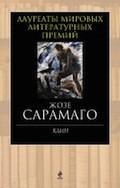
«Каин» — последний роман Сарамаго, вызвавший скандал и обвинения писателя в дерзком перекраивании Библии. Он сделал своим главным героем братоубийцу Каина. Почему именно он, злодей, ненавидимый всеми, совершивший одно из самых страшных преступлений за всю историю человечества, удостоился внимания Сарамаго? Чем привлек его? Силой ли характера? Или тем, что был отвержен и гоним? Великий португалец разрушает привычные мифы и вместо них предлагает читателям мифы новые, которые завораживают своим величием и одновременно покоряют простотой.
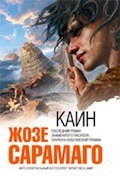
«Каин» — последний роман Сарамаго, вызвавший скандал и обвинения писателя в дерзком перекраивании Библии. Он сделал своим главным героем братоубийцу Каина. Почему именно он, злодей, ненавидимый всеми, совершивший одно из самых страшных преступлений за всю историю человечества, удостоился внимания Сарамаго? Чем привлек его? Силой ли характера? Или тем, что был отвержен и гоним? Великий португалец разрушает привычные мифы и вместо них предлагает читателям мифы новые, которые завораживают своим величием и одновременно покоряют простотой.
Serbia
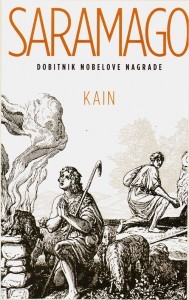
Povest čovečanstva je povest njegovog nesporazuma s Gospodom, niti on razume nas niti mi razumemo njega.
„S gospodom bogom nema šale“ glasi jedna rečenica iz Kaina, Saramagovog završnog obračuna sa judeo-hrišćanskom tradicijom. U ovom zaprepašćujućem književnom apokrifu Bog je negativac, anđeli su loši momci, a samo je Kain, božjom voljom ubica svog brata Avelja, istinski preobraćenik i svedok brojnih božjih nedela i osionosti. Zahvaljujući moći da putuje kroz vreme, jer je osuđen na večito lutanje, Kain prelazi „iz proteklih u buduće vidove sadašnjosti“, od Prvog greha do Potopa, preispitujući tako starozavetne priče o postanku sveta, Sodomi i Gomori, rušenju Jerihona, Avramovom žrtvovanju svog sina Isaka, iskušavanju pravednoga Jova, zidanju Vavilonske kule, krvavim ratovima plemena Izrailjevog za Obećanu zemlju…
Lišavajući se uobičajenog nakita pismenosti, portugalski nobelovac je svojim poslednjim objavljenim romanom krunisao jednu visoku književnu građevinu, sazdanu od sve samih parabola u čijoj je jezgri osporavanje pravaca kojima je čovek krenuo i vrednosti koje je izneverio – umnogome vođen rukom svoga tvorca.
„Ova priča nas jednostavno nosi, utoliko više što varnice koje iskre iz piščeve radionice potvrđuju da smo u rukama neponovljivog majstora.“ New York Times
„Do sad neviđena blasfemija Starog zaveta… Poigravajući se u svom stilu sa pravopisnim normama, Saramago u ovom romanu neprestano nalazi pukotine u logici biblijskog boga.“ New Yorker
Sweden
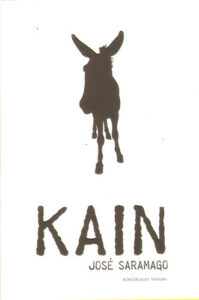
Kain mördade sin bror Abel och dömdes av Herren att vandra ensam och vilsen i världen. Historien är välkänd, men aldrig har den berättats som här. I sin sista roman gör José Saramago på sitt oefterhärmliga vis historiens första mördare till en antihjälte med en osviklig förmåga att dyka upp på rätt plats vid rätt tidpunkt. På sina vandringar får den upproriske Kain vara med om det mesta: han råkar befinna sig på Moria berg just när Abraham ska offra sin son Isak, han får se Babels torn förstöras och Sodom och Gomorra utplånas, han ser på nära håll hur Job får utstå Herrens prövningar. Varje gång förundras han av Guds känslokalla och godtyckliga handlande, och varje gång konfronterar han honom.
Kain är en provocerande och mörkt humoristisk omskriv ning av Gamla Testamentet. Liksom i Evangeliet enligt Jesus Kristus (1991), där Nya Testamentet gavs en liknande behandling, ger Saramagos blick och berättarförmåga nytt liv och ny innebörd åt de gamla historierna.
Turkey
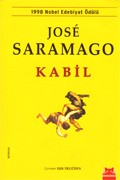
Saramago’nun ölmeden önce yazdığı son romanı…
José Saramago ölümünden önce yazdığı ve yayımlandığı ülkelerde büyük tartışmalara yol açan son romanında insanlığın kutsal kitaplardaki başlangıcına geri dönüyor.
Adem ile Havva’nın oğlu, kardeş katili, “sürgün ve gezgin” Kabil’le çıkılan bu yolculuk, Eski Ahit’in loş ve tekinsiz diyarlarında, zaman ve mekân kavramlarını altüst ederek, süreğen bir şimdiki zaman içinde, edebiyatla felsefenin kesiştiği dar alanlarda dolaştırıyor okuru.
Suç, ceza, adalet, nefret, ihtiras gibi insana özgü kavramlar ile savaşlar, katliamlar, cinayetler, boyun eğmeler ve isyanlar gibi insana özgü eylemler arasında gidip gelirken, İbrahim’den Nuh’a, Adem ile Havva’dan Eyüb’e, Lilith’e kadar bütün kadim şahsiyetler de beklenmedik anlarda ve yerlerde karşımıza çıkıp insanlık panoramasını tamamlıyorlar.
Gerçeğin ironik, yalın ve dolaysız dilini kullanan Saramago bu son romanıyla bize tüm zamanların sorusunu miras bırakmış oluyor: İnsan türü evrendeki yerini ve varlığını hak etmiş midir?
(Tanıtım Bülteninden)
Ukraine
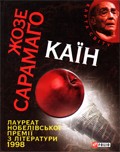
У своєму останньому романі Жозе Сарамаґо (1922—2010) розповідає історію Каїна, який посмів засумніватися у всемогутності Бога і кинути йому виклик. Бог укладає з героєм «договір про розмежування відповідальності за смерть Авеля», і Каїн вирушає в подорож у старозавітні часи: торгуватися з янголами, дивитися, як споруджують Вавилонську вежу, допомагати Ною будувати ковчег…
